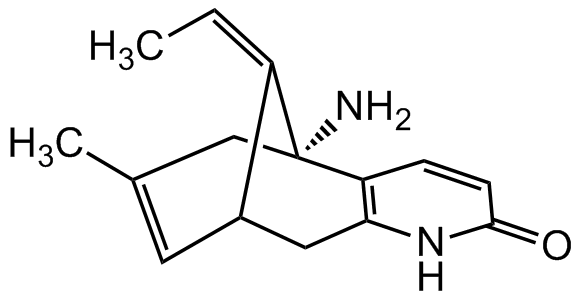(-)-Huperzine A
| Code | Size | Price |
|---|
| CDX-H0208-M025 | 25 mg | £121.00 |
Quantity:
Prices exclude any Taxes / VAT
Overview
Host Type: Plant
Regulatory Status: RUO
Shipping:
AMBIENT
Storage:
+4°C
Images
Documents
Further Information
Alternate Names/Synonyms:
Hup A; (-)-Selagine; Kimpukan A
Appearance:
White to off-white powder.
CAS:
102518-79-6
Class:
6.1
EClass:
32160000
Form (Short):
solid
GHS Symbol:
GHS06
Handling Advice:
Protect from light and moisture.
Hazards:
H300
InChi:
InChI=1S/C15H18N2O/c1-3-11-10-6-9(2)8-15(11,16)12-4-5-14(18)17-13(12)7-10/h3-6,10H,7-8,16H2,1-2H3,(H,17,18)/t10-,15+/m0/s1
InChiKey:
ZRJBHWIHUMBLCN-ZUZCIYMTSA-N
Long Description:
Chemical. CAS: 102518-79-6. Formula: C15H18N2O. MW: 242.32. Huperzine A is a natural sesquiterpene alkaloid. It showns neuroprotective activity. It is a potent acetylcholinesterase (AChE) inhibitor and displays oral AChE inhibitory activity in animals. Huperzine A has potential applications in a variety of neuroprotective roles, including protection against organophosphate nerve agents and ameliorating symptoms of Alzheimer?s disease. It has been shown to reduce neuronal cell death caused by glutamate and to have anti-inflammatory effects. It also has been shown to be an antagonist of NMDA receptor in cerebral cortex. It has been shown to ameliorate cognitive deficits.
MDL:
MFCD01714949
Molecular Formula:
C15H18N2O
Molecular Weight:
242.32
Package Type:
Vial
PG:
II
Product Description:
Huperzine A is a natural sesquiterpene alkaloid. It showns neuroprotective activity. It is a potent acetylcholinesterase (AChE) inhibitor and displays oral AChE inhibitory activity in animals. Huperzine A has potential applications in a variety of neuroprotective roles, including protection against organophosphate nerve agents and ameliorating symptoms of Alzheimer?s disease. It has been shown to reduce neuronal cell death caused by glutamate and to have anti-inflammatory effects. It also has been shown to be an antagonist of NMDA receptor in cerebral cortex. It has been shown to ameliorate cognitive deficits.
Purity:
>98% (HPLC)
Signal Word:
Danger
SMILES:
C/C=C1[C@@H]2CC3=C(C=CC(N3)=O)[C@@]/1(N)CC(C)=C2
Solubility Chemicals:
Soluble in DMSO (20mg/ml) or methanol (1mg/ml).
Source / Host:
Plant
Transportation:
Excepted Quantity
UN Nummer:
1544PSN1
UNSPSC Category:
Natural Products/Extracts
UNSPSC Number:
12352200
Use & Stability:
Stable for at least 2 years after receipt when stored at +4°C.
References
(1) S.J. Geib, et al.; Acta Crystallogr. C. 47, 824 (1991) | (1) H.S. Ved, et al.; Neuroreport 8, 963 (1997) | (1) J.M. Zhang & G.Y. Hu; Neuroscience 105, 663 (2001) | (1) R.K. Gordon, et al.; J. Appl. Toxicol. 21, S47 (2001) | (1) J. Zhou & X.C. Tang; FEBS Lett. 526, 21 (2002) | (1) R. Wang & X.C. Tang; Neurosignals 14, 71 (2005) (Review) | (1) H.Y. Zhang X.C. Tang; Trends Pharmacol. Sci. 27, 619 (2006) (Review) | (1) Z.F. Wang, et al.; J. Neurochem. 106, 1594 (2008) | (1) X.Y. Mao, et al.; Int. J. Mol. Sci. 15, 7667 (2014) | (1) H.Y. Zhang, et al.; Cell Mol. Neurobiol. 28, 173 (2008) (Review) | (1) U. Damar, et al.; Expert Rev. Neurother. 16, 671 (2016) (Review)



